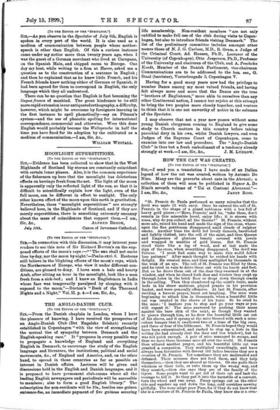THE ANGLO-DANISH CLUB.
[To THE EDITOR OF THE "SPECTATOR."] SIR,—From the Danish chaplain in London, whom I have the pleasure of knowing, I have received the prospectus of an Anglo-Danish Club (Bet Engelske Selskab) recently established in Copenhagen "with the view of strengthening the mutual ties of sympathy between Denmark and the English-speaking race." It "proposes in every possible way to propagate a knowledge of England and everything English in Denmark, to encourage the study of the English language and literature, the institutions, political and social movements, &c., of England and America, and, on the other hand, to spread in those countries as far as possible an interest in Danish affairs. Lectures will be given and discussions held in the English and Danish languages, and it is proposed to have permanent club-rooms where all the leading English newspapers and periodicals will be accessible to members: also to form a good English library." The subscription for non-residents will be 108., besides one guinea entrance-fee, an immediate payment of five guineas securing life membership. Non-resident members "are not only entitled to make full use of the club during visits to Copen- hagen, but also to introduce friends visiting Denmark." The list of the preliminary committee includes amongst other names those of N. J. G. Carlsen, M.D., R. Gram, a Judge of the Criminal Court, Ad. Hansen, Ph.D., Lecturer of the University (of Copenhagen), Otto Jespersen, Ph.D., Professor of the University and chairman of the Club, and A. Peschcke Koedt, Member of the Danish Parliament, vice-chairman Communications are to be addressed to the hon. sec., G. Staal (barrister), Vesterbrogade 3, Copenhagen V.
Having for a good many years now had the privilege to number Danes among my most valued friends, and having felt always more and more that the Danes are the true "brothers of Englishmen," more akin to ourselves than any other Continental nation, I cannot but rejoice at this attempt to bring the two peoples more closely together, and venture to think that it is one not unworthy of notice in the columns of the Spectator.
I may observe that not a year now passes without some young Danish clergyman coming to England to give some study to Church matters in this country before taking parochial duty in his own, whilst Danish lawyers, and even Judges of the Supreme Court of Copenhagen, come to examine into our law and procedure. The " Anglo-Danish Club" is thus but a fresh embodiment of a tendency already strongly at work.—I am, Sir, &c., J. M. LUDLOW.






































 Previous page
Previous page